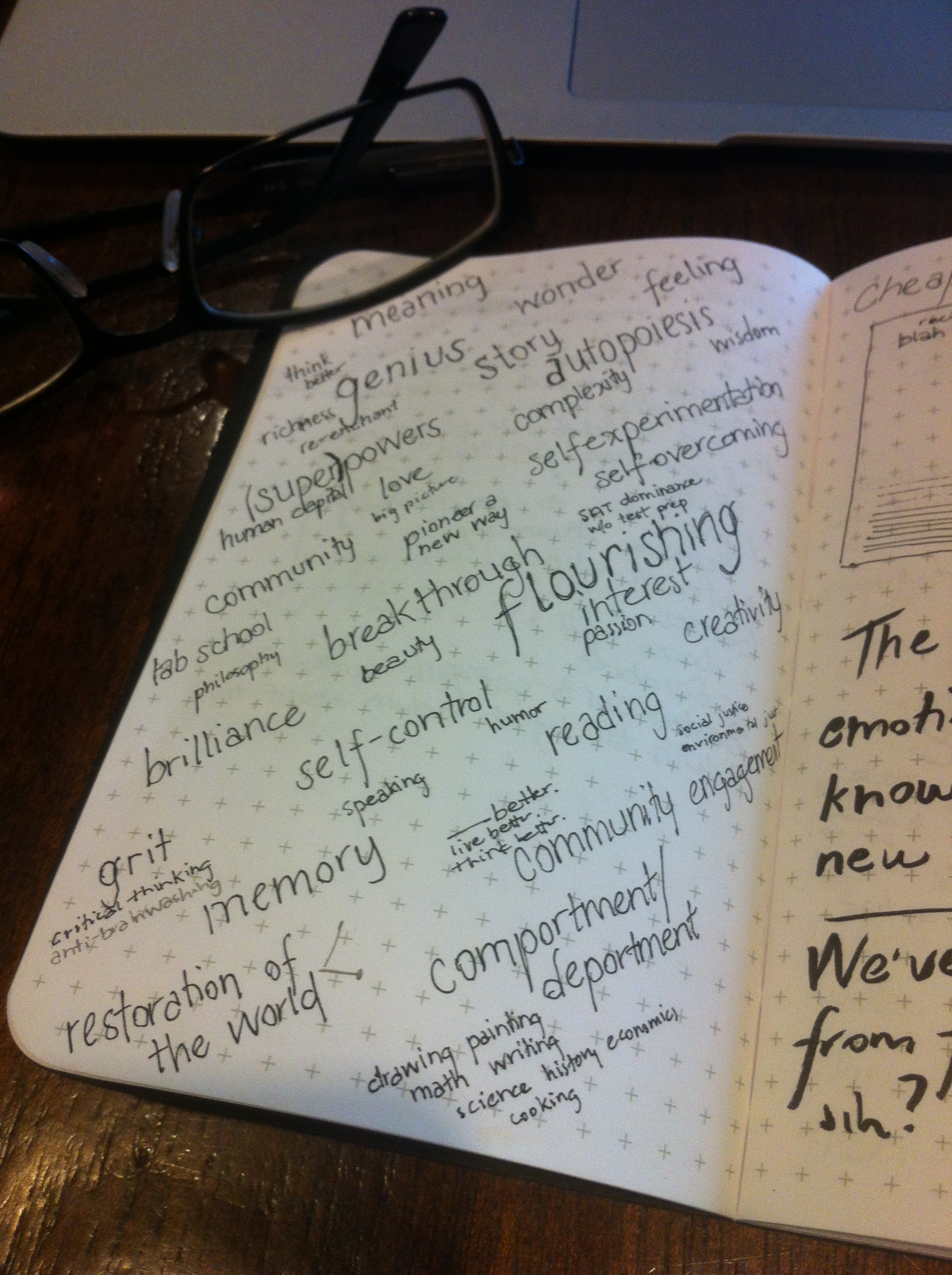 Nietzsche wrote:
Nietzsche wrote:
the imagination of the good artist or thinker produces continuously good, mediocre or bad things, but his judgment, trained and sharpened to a fine point, rejects, selects, connects…
In the spirit of producing good, mediocre, and bad ideas, so we can winnow them down the best, let me kick off a long(ish) list of the potential Big Fat Goals for our school!
A. Genius/Brilliance
Should the aim of our school be to regularly pump out brilliant kids who can do amazing things with their minds?
I’m not talking IQ here — or at least not primarily. Though IQ seems to be quite elastic, it seems that how far it can be stretched does have some limits. (The largest contributions to IQ seem to be one’s experience in abstract thinking, and the amount of information one is able to hold in one’s working memory.)
(That said, if some trustworthy method does arise for radically expanding IQ — as seemed to be the case for a while with the double-n-back-tests, I’m not opposed to talking about whether our school would like to embrace it.)
More importantly, folk tend to fixate on IQ in a silly manner that makes more of the measure than seems justified. The correlation between IQ and any measure of success isn’t particularly strong. Having a ridiculously-high IQ doesn’t seem to guarantee that one will do impressive things with his or her brain, as the Terman Study famously showed.
Doing impressive things with your brain: that’s what I’m excited by. How can we help kids become adults who think smarter and harder than others do on problems that matter? Who bring together insights from diverse fields to make new breakthroughs? Who find all this fun?
Again, this is less a product of hardware than it is of software. Brilliance isn’t the product of just one factor (e.g. IQ, skull size), but rather a whole host of factors. (I’ll be spending much of the next year, in my “How to Become a Genius?” course — exploring those factors, and blogging about them here.)
Do we want to make meeting that “whole host of factors” one of the big goals of our school?
I’ll give the last word here to Jonah Lehrer, in his somewhat-overrated-and-much-maligned-but-I-think-eminently-useful-food-for-thought book Imagine: How Creativity Works:
In fact, we’ve already proven that it’s possible to create a period of excessive genius, a moment that’s overflowing with talent. The only problem is that the geniuses we’ve created are athletes.... The question now is whether our society can produce creative talent with the same efficiency that it has produced athletic talent. Our future depends on it. (p. 239)
I like this.
B. Flourishing/Well-being/Happiness
Living well is difficult, and it seems useful for our school to help kids (and faculty, and the community at large) reflect on and practice it.
Flourishing — my favorite synonym for this — can be tied into the academics of our school. The questions of the good life have strong ties to literature: some of our greatest novels, poems, and sugary-breakfast-cereal jingles make definite (and competing) claims to what will really make us happy. History is, in part, the story of groups and individuals seeking to flourish, according to their understandings of flourishing. Religions and philosophies (as I explore in my World Religions/Worldviews course) contain explicit theories as to what the good life entails, and how to achieve it. The arts have long contended that they provide a necessary role in ensuring human happiness.
All in all, a deliberate focus on well-being can bring us deeper into the liberal arts curriculum. By emphasizing flourishing, we can make our school more academic.
(Flourishing can also link to the social sciences, and the natural sciences. What is the cognitive psychology undergirding human happiness? What is the evolutionary psychology that has led Homo sapiens to a particular happiness formula? What are the economics of happiness? What is the sociology? More broadly, does it make sense to talk about “the good life” of other species? A chimpanzee? Can a duck flourish? Can an evergreen? Can fungi?)
But the deeper payoff of a focus on flourishing is the strong personal and community angle. It’s not enough to talk about the good life, at least in a K-12 school; we must also experiment with living it!
This would, I imagine, include a host of diverse practices. Anti-bullying programs would definitely fit under this. Meditation might, too. Communal eating, and group rituals, could come into this, as could nuanced discussions of the role that competition plays in our school. Should we bring plants and animals into the classroom? What should our architecture be? All these topics, and more, could appropriately come under a big goal of “flourishing.”
“A school for flourishing.” I like that.
More to come! In the meantime, please do post your thoughts, critical as well as supportive!